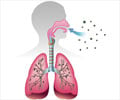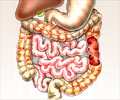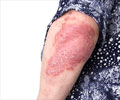Multidrug resistant tuberculosis occurs due to the bacterial resistance for the first line anti-TB drugs.

- Bedaquiline is interestingly the first Tuberculosis drug that has been approved by Food and Drug Administration (FDA) in over 40 years.
- Bedaquiline is perhaps the first drug that can eradicate bacteria of tuberculosis from the patient's sputum and make him non-infectious.
- Bedaquiline can dramatically improve outcomes of patients suffering from multi-drug resistant tuberculosis (MDR-TB).
- In 2014, 9.6 million people were affected by tuberculosis infection and there were almost 1.5 million TB-related deaths worldwide.
Tuberculosis is caused by a bacteria called Mycobacterium tuberculosis. It is mainly spread through air when the infected person sneezes, coughs or talks and the bacteria usually attacks the lungs but can also damage other parts of the body like the kidney, spine and the brain.
Symptoms of TB include bad persistent cough, chest pain, coughing up of blood or sputum, weakness, weight loss, chills, fever and sweating in the night. Latent TB infection occurs when the person breathes the TB bacteria but does not provide any symptoms of tuberculosis.
Multi-drug resistant Tuberculosis (MDR-TB) is a form of tuberculosis which occurs due to the resistance caused by the bacteria to the first-line drugs (isoniazid and rifampicin) used in tuberculosis treatment. First line anti-TB drugs are more effective and produce less toxic effects while Second line anti-injectable agents like kanamycin, amikacin, capreomycin and streptomycin are less effective and may provide more toxic effects. Second line drugs are commonly used in the treatment of MDR-TB. There are also third line drugs like drugs from the Fluoroquinolones group such as Levofloxacin, moxifloxacin and ofloxacin.
Diagnosis of tuberculosis is carried out by two kinds of tests namely tuberculin skin test (Mantoux tuberculin skin test ) by injecting a small amount of fluid called tuberculin into the skin in the lower part of the arm and TB blood test which is also known as interferon gama release assays (IGRA) measures the patient’s immune system reaction to M. tuberculosis.
More About Bedaquiline in India
Bedaquiline in combination with at least three other TB drugs is used to treat pulmonary MDR -TB in adults. It is also used when other drugs cannot be used because of their side effects.According to a recent release, use of Bedaquiline for MDR- TB and XDR-TB has been rolled out under the Revised National Tuberculosis Control Programme and is part of co-ordinated programme between the government and Johnson & Johnson. The drug will be made available in six public hospitals in Delhi, Mumbai, Chennai, Guwahati and Ahmedabad.
Although the cost of the drug has not yet been decided, the report states that Janseen is believed to be offering the drugs through a tiered-pricing structure, for example they have priced it as $3,000 for middle-income countries and $900 for low-income countries.
Tuberculosis control measures concentrate efforts mainly on reducing the risk of uninfected people who are exposed to people with TB, by reducing the amount of tubercle bacilli in air and use of respiratory protective equipment. Hospitals and clinics should also take precautions to prevent the spread of tuberculosis by setting up an infection control plan which helps in prompt detection and treatment for the affected people. Early vaccination with BCG vaccine (which stands for Bacillus Calmette-Guérin vaccine) protects children against tuberculosis.
World Tuberculosis day is recognized on March 24 every year and “Unite to end TB” is the theme for 2016.
References:
- www.niad.nih.gov
- www.tbfacts.org/bedaquiline
- https://www.nlm.nih.gov/medlineplus/tuberculosis.html
- http://www.cdc.gov/tb/publications/factsheets/testing/diagnosis.htm














